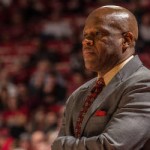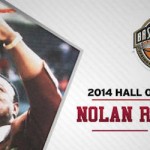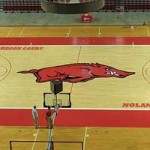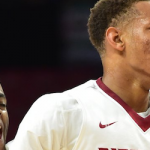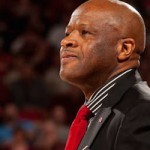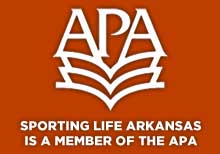 Nolan Richardson never backed down. Not as a hard-nosed player at Texas Western, or as a harder-nosed coach in El Paso, Tulsa or, of course, Fayetteville.
Nolan Richardson never backed down. Not as a hard-nosed player at Texas Western, or as a harder-nosed coach in El Paso, Tulsa or, of course, Fayetteville.
It’s an approach that took him to the top of his profession in terms of accomplishment and, now, prestige. On Friday night, with luminaries like Magic Johnson and Bill Russell looking on, Arkansas’ most beloved coach was inducted into the Basketball Hall of Fame in Springfield, Mass.
The morning of his big day, he sat down with me the morning of his induction to talk about his path here, and what could lie ahead for the Hogs basketball program. As usual, Nolan Richardson didn’t hold back. And we love him for it.
Editor’s Note: The following is excerpted and edited from a 70-minute talk.
Q: To you, is there a hierarchy to all the hall of fames you’ve now been inducted into? Is this the pinnacle?
Nolan: I think there’s only one left. [pointing upward, smiling] If I can make that Hall of Fame … [the Basketball Hall of Fame] is the pinnacle. Every basketball player and coach aspires to be in the hall one day.
Q: Is there anyone who has not yet been inducted you would like to see join you?
Nolan: I think Eddie Sutton has been around a long time, has won a multitude of games, Final Fours. Every place he’s been he’s been to NCAA tournaments. He certainly took Arkansas to the Final Four, took Oklahoma State to a couple Final Fours … he comes to mind immediately.
Q: Along with John Thomspon, Nate “Tiny” Archibald will induct you during the ceremony tonight. I know you and “Tiny” both attended what’s now the University of Texas – El Paso under Don Haskins some years apart, but what’s your connection?
Nolan: At the time, I was a high school coach in El Paso. Haskins would bring by a lot of the UTEP players to me and one of my long-time assistants, Andy Stoglin. About three or four times a week, Tiny came over to my gym to shoot or I’d take some of my kids to UTEP to play.
Well, Tiny almost left us. He was a New York kid and being in El Paso was a day and night difference. We kind of got him under our arms, kind of shielded him and helped him get over that wanting to go home. He stayed and became a tremendous basketball player. After he went to the pros, I brought him came back in the summer and I made him the head coach of my high school team in a little AAU league. We became pretty good friends.
Q: I got to ask you about one of the stories Ernie Murray [a Razorback in the 1980s] told at a Downtown Tip Off Club meeting this spring in North Little Rock. He talked about how you used to turn the light off prepping the team and wear a white suit. Why that practice?
Nolan: It’s amazing the stories about me, some of them I’ve never heard of … We did [light turning off] with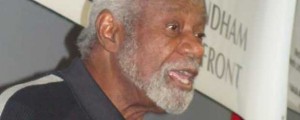 coach Haskins. He would come in and turn the lights off, give us a few minutes to gather our thoughts, get ready to paticipate and get ready for the game. So we did that all throughout my time in Arkansas.
coach Haskins. He would come in and turn the lights off, give us a few minutes to gather our thoughts, get ready to paticipate and get ready for the game. So we did that all throughout my time in Arkansas.
Q: You’ve seen Bobby Portis play. He’s up to 6-11, put on some muscle, been to the camps, I assume developing skill-wise. Does he have the tools to be the best big man the program has ever produced?
Nolan: I don’t see him as a center, which is good, because he can put it on the floor, he’s very agile, he can run … I wouldn’t say he’d be the best of all of them. He’d be up there with them. I don’t get to see him every day – Mike [Anderson] does. Mike got to see Oliver Miller develop every day. Eddie got to see Joe Kleine everyday. I’m kind of old school. I don’t think the players of today are as good as the players of yesterday. I think it’s a “me” mentality more than anything else.
Q: But with Bobby specifically I don’t see that. Do you?
Nolan: No, I don’t. That’s why I would say he would rank up there with those guys, because he’s not selfish. And that’s unusual.
Q: Ernie Murry said he just didn’t see enough tough players on the Razorback team last year, and that really hurt them. Do you agree?
Nolan: Yeah, you know … I see the kids coming up today and there’s really not a lot of mental toughness together anymore. They spend a lot of time of the computer and the telephone, instead of on the basketball court playing. Kids today – they won’t go in a gym unless it’s an air conditioned gym. I played outside. My kids played outside – there was no gym. And so, to me, you mentally grew tougher when you fell on the cement and concrete. You played physically … there used to be parks filled with kids playing basketball. [Expletive deleted], you go to a park now, they might be playing a game alright, but it’s on this computer. It’s just not the same.
Q: Six of Mike Anderson’s players graduated last March. He had nine players with a 3.0 GPA or higher. Looking back on your time in Arkansas, do you wish you had focused more on your players’ academics and making sure they graduate?
Nolan: There’s no coach in America who put more focus on education than I did. That’s why this school is named after me [points to “Nolan Richardson Middle School Jaguars” logo on his shirt]. I’m into education. It’s the times. When I left Tulsa, I had five of them graduate – all on time … You cannot blame the coach for your kid not graduating. If that’s the case, then you need to also put emphasis on the professors that teach them.
Why aren’t you doing your job? We all have to do a job. That’s the problem nowadays in this country with our kids. Our kids are out of control. There is no supervision at home … My players, some of them had kids already. You have no clue. If you live in a white ivory tower looking down, you have no clue. So now, when they get through, they want to make a dollar. I did it. When I graduated from college, I already had two kids. I needed another year in college – I left, tried the pros, tried football, to make a dollar. Then I came back and got my degree.
What about the ones who come back later on and graduate?… Because you can always graduate, but you can’t always play [pro] basketball. So the window of opportunity is what we’re looking at … Look at Ron Brewer, everybody in the world thinks the world of him – it took him 28 years to graduate, but he graduated. He had an NBA career … Corliss left [early]; he was counted against me. Scotty left, he was counted against me. They both got degrees now … Even Ron Huery got a degree. They counted him against me, but he got a degree…
Lee Mayberry just moved back to Fayetteville to get his degree. I’m as happy about him saying he’s gonna get his degree as I was happy when he said he was going to the NBA. He’s got five girls; he’d made a pretty decent living, told me ‘I can go back to school and get my degree.’ He’s coming this year – he’s commuting – he got him a house in Fayetteville…
Q: OK, that’s not a regret of yours. But do you have any regrets from your days at Arkansas?
Nolan: The only thing I regret is that I should have worked the [expletive deleted] out of them harder. [The former players] are laughing at me now that I worked them so hard. That was always the complaint about how hard I worked them – on the floor, in the classroom.
Q: Looking ahead, it will be interesting to see how Razorback basketball does this season. There’s a lot of high hopes for this team.
Nolan: It’s Year 4 [of the Anderson era], and he’s got some pretty good pieces coming back. If they improve 15%, I think they’ll be in the NCAA Tournament. It’s amazing how, all of the sudden, if you just knock off a team and get on a run, and start believing…
* * *
Richardson will have time enough on the sideline this coming season to watch that whole story – which would be a coda to his own legacy – unfold. But Friday night was his time take center stage, to revel once more in the runs his own teams went on, and all the believing that came before and after.
* * *
Evin also spoke to Sidney Moncrief last week, too. Here’s what the next Razorback HOF inductee has to say. And here is Nolan’s feature profile article – replete with images of stunningly polka dotted attire – in the official HOF enshrinement program.




